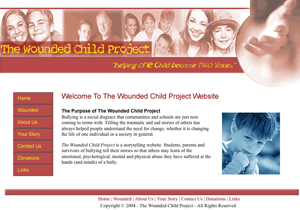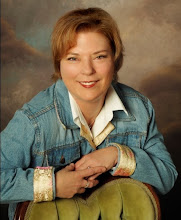It is a long road winding through the memories of childhood, a journey that wearies me body and soul. For several days I have struggled with writing this essay on being bullied as a child. Reliving the abuse of childhood is almost as bad as being there and going through it.
Like many women I know, I was raised to be a nurturer, to understand that some young boys have anger issues, to forgive and forget, and to not blab any family secrets. For good reasons, too, but the effects of these beliefs--physical and psychological-- can be debilitating. Not only does secrecy condone bullying, it fosters the notion that actions have no consequences. I have been told this issue is a dead horse and to leave it behind me; but I am telling you, this old nag has a lot of voice left to bray about bullying.
My working mother raised two children on her own after my father walked out on us. He took the only car and closed the bank account, leaving in his wake two very young, sad children and a devastated wife with overdue bills and the social stigma of being a divorcee. But fortunately for us, most of our neighbors supported us, especially when the man next door, a social worker, petitioned to have me and my brother taken away from my mother. Ironically, that neighbor’s son was one of my worst bullies. Between him and my brother, I was tormented daily--verbally and physically. Once, as the neighbor boy was chasing me through my house to punch me, I pivoted in mid-stride and swung as hard as I could. I smacked his face and he went flying through a plate glass window, bouncing on his butt across the porch; fortunately for him, he had only a bruised ego. I, on the other hand, had to pay for the window out of my meager babysitting funds. My brother’s constant taunting, slugging, and bruising me--even once breaking my front tooth--was always dismissed by the adults around me as ”accidental”. Definitely not accidents--I was there, remember? Another neighbor boy, the oldest of five kids, the one I so wished had been my brother, was not allowed by his parents to harass, let alone, hit his sister. He often had the compassion to tolerate me as a handicap to him when we all played games together.
After a while, because it did no good to ”tattle”, I avoided being near my brother or anyone else, for that matter. At school, I was teased for being chubby and having “slanty” eyes, which adults were wont to assure me would be an asset when I grew up. Well, I used to wonder, how does that help me now? I learned to not trust, neither adults nor peers. All these years later, the muscles of my shoulders, and especially my neck, remain chronically and painfully tight, the aftermath of years of anxiety and tension from feeling unsafe. The interesting thing for me is that when I began to write this article, my shoulder and scalene muscles--that often tighten like hands choking my throat--have started to relax. Perhaps it is the result of the gifted massage therapist I see regularly; perhaps it is because I am finally telling my story.
In my early thirties, my brother approached me with an offer of financial restitution for the dental work I had on my front tooth he broke when we were kids. It was more than a kind gesture, for it allowed us to openly discuss our dysfunctional childhood relationship and work towards an adult friendship. Our friendship did not happen overnight. We have had several head butting clashes since then, but I am truly thankful to know him as the loving and caring nice guy he turned out to be.
I would like to say that I have never encountered another bully as an adult, but sadly that is not the case. I married an older man, which has made me a target for some pretty nasty comments by adult bullies. I have been blind-sided by a relative I truly liked and respected whom I thought liked and respected me. Hit and run. It is no accident that the bully uses this cowardly tactic to disarm his victim in a social situation. I was once introduced to a room full of people by a man who is supposed to be a friend of my husband with the words, “His wife, who hasn’t yet taken his money and left him,” as if that was a very clever remark. At that moment, I felt beneath a spotlight with uneasy eyes focused upon me, the bystanders waiting for me to make a scene, or swallow my pride and behave appropriately. Then, at an extended-family celebration, I was sideswiped in the food line by a young woman I do not know with the question, “Older man, married him for his money, huh?” The one barb that hurt the most happened at the annual Christmas Eve dinner I host. An in-law I considered to be a friend whispered under his breath as I passed out presents, referring to a dispute over the pronunciation of a word.
In each instance, the bully counts on the fact that I will not disrupt the social situation and call him or her out in front of the others. That I will not confront him. As in most bullying scenarios, it is a complicated situation. Any retort, unless exceptionally witty, will seem petty, or at best, a lame defense. If I challenge the bully, and spar verbally, then it has to escalate to a winner-take-all and leave the other bleeding. At a family gathering, then, do I want to lay it on the line, knowing eventually that everyone will have to take sides or feel so uncomfortable they want to leave early. It is a losing proposition. I am left resentful and wounded in all cases, and chew on the could-have-said-this, should-have-said-that roiling in my thoughts for too long. Over the years and after much consideration, I have decided how to handle this sort of instance: I refuse to be in the company of a person who disrespects me. I cannot “make” my husband disassociate from his friend, but I do not choose to be around the so-called friend and draw the line at my door when I am home. The young woman at the family dinner got the “rolling my eyes heavenward and sigh” routine that her remark deserved. My in-law with the proper speech fixation I avoid because I am not sure yet how to approach the subject.
Like other victims, I want to forget how confused, angry, and ill-treated I felt by the bullies and stop agonizing over what they said…what I did not say. There is an oft-told Zen Story that impresses me as I try to remind myself of the wisdom of letting go.
A senior monk and a junior monk were traveling together. They came to a river with a strong current. As the monks were preparing to cross the river, they saw a very young and beautiful woman also attempting to cross. She asked if they could help her.
The senior monk carried this woman on his shoulder, forded the river and let her down on the other bank. The junior monk was very upset, but said nothing.
They both were walking and senior monk noticed that his junior was silent and enquired “You are upset?”
The junior monk replied, “As monks, we are not permitted a woman. How could you then carry that woman on your shoulders?”
The senior monk replied, “I left the woman a long time ago at the bank. However, you are carrying her still.”
A bully needs to feel powerful and does so at someone else’s expense, and conversely, is insecure about his/her own capabilities to be liked or respected by family, friends and associates. It helps me to temper my reactions to think the bully is someone who is jealous, a soc-psych major impressed with herself, or someone needing to challenge authority. I remind myself that these bullies are the ones who suffer from their insecurities and eventually most people will avoid them. The one positive outcome from my life experiences is the awareness I have of my own actions and words. I think twice before saying anything that might have overtones of bullying. And I know how to convey a lot with a long sigh and an even longer stare. I just wish I did not even have to go there at all. I search for resolutions and reasons, justice and forgiveness, a knight errant on a quixotic crusade against bullies.




 This fall has been the season for sharing my books directly with readers during local book events. In late September, I exhibited at the
This fall has been the season for sharing my books directly with readers during local book events. In late September, I exhibited at the  On Sunday, October 14th I attended the
On Sunday, October 14th I attended the 








